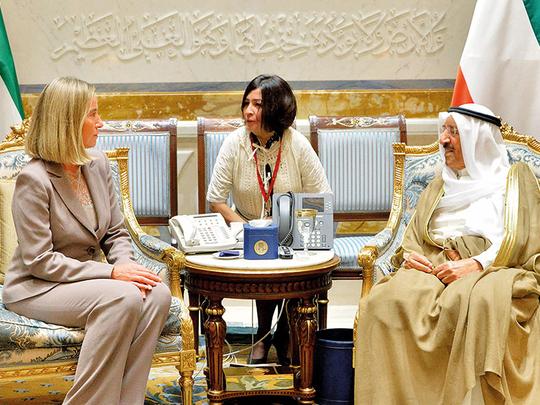
Manama: Kuwait has mobilised its security agencies to track down the 16 terror convicts who had disappeared after the Cassation Court ruled they were guilty and sentenced them to jail terms.
Although a newspaper report said that 14 of the convicts had fled to Iran after they were smuggled out via small boats to an Iranian vessel in international waters, the Kuwaiti authorities are exerting extraordinary efforts to locate them in the country.
The fingerprints of the 16 convicts in the Abdali terror cell case were provided to all border police checkpoints to help them identify them in case they attempted to flee the country using fake Kuwaiti or foreign passports or bogus identities, Kuwaiti daily Al Rai reported on Sunday.
“All border staff have been told to be extra vigilant and to follow the strict procedures in suspicious cases by referring suspects to the security authorities at the checkpoint or using the digital fingerprints,” a security source told the daily.
Another Kuwaiti daily, Al Seyassh, on Sunday reported the state was also relying on military intelligence services in its endeavours to arrest the convicts.
Sources told the daily that the government would not rush into revoking the citizenship of the convicts as suggested by some lawmakers.
The government does not want to lose the opportunity to repatriate its citizens in case the convicts were arrested abroad, the sources said.
No emergency session will be held by the parliament to discuss the terror cell and the stance vis-à-vis Iran and Hezbollah, both accused in the case of intelligence and cooperation with the convicts.
“There will be either a session in the next parliamentary term or a meeting of the foreign affairs committee during the summer holidays to be attended by the foreign minister,” the sources added.
As lawmakers pressed for the prompt arrest of the convicts, MP Khalid Al Shatti called for an alliance with Turkey and the use of some of its troops following the escalation with Iran and the instability in Iraq.”
On Thursday, Kuwait asked the Iranian embassy to reduce the number of its diplomats from 19 to four, and gave the personae non gratae 45 days to leave the country.
The request was made in a protest letter to the Iranian diplomatic mission in Kuwait, asking for shutting down the cultural mission, the military bureau and technical offices and announcing that all joint commissions between the two countries were suspended.
On Saturday, Kuwait lodged a protest with the Lebanese government, urging it to assume its responsibilities towards “irresponsible practices by Hezbollah, a component of the government.”
Kuwait’s Ambassador to Lebanon Abdul Aal Al Qenaei announced the protest as he made comments on reports cited by social media regarding a missive from the Kuwaiti foreign ministry to Lebanon following the verdict by the Court of Cassation in the case of Al Abdali terror cell.
The ruling pronounced in June following a long trial affirmed the involvement of Hezbollah in intelligence, coordination of meetings, payment of funds, and provision of weapons and training on Lebanese territory with the aim of destroying the basic infrastructure of the State of Kuwait.
On August 13, 2015, Kuwait’s Interior Ministry said that it busted a terrorist cell and uncovered a large cache of arms, ammunitions and explosives hidden underground at a farm in Abdali. The cache contains 24 hand grenades, 65 guns, 56 RPGs and 144kg of bomb-making material.
On September 1, 2015, Kuwait’s public prosecution said 26 defendants, including one Iranian, would stand trial for the possession of weapons, ammunition and explosives and espionage for Iran and Hezbollah.
However, the Iranian embassy on September 3 downplayed the significance of the terrorist cell and the charges of espionage, saying that the case was a domestic Kuwaiti issue pertaining mainly to the discovery of weapons and ammunitions.
In June, the Cassation Court cancelled the acquittal of defendants and sentenced two to 15 years in prison, 15 to 10 years and three to five years.












